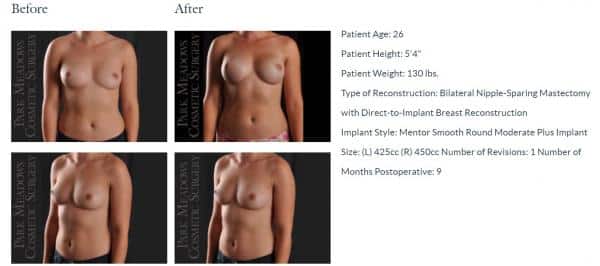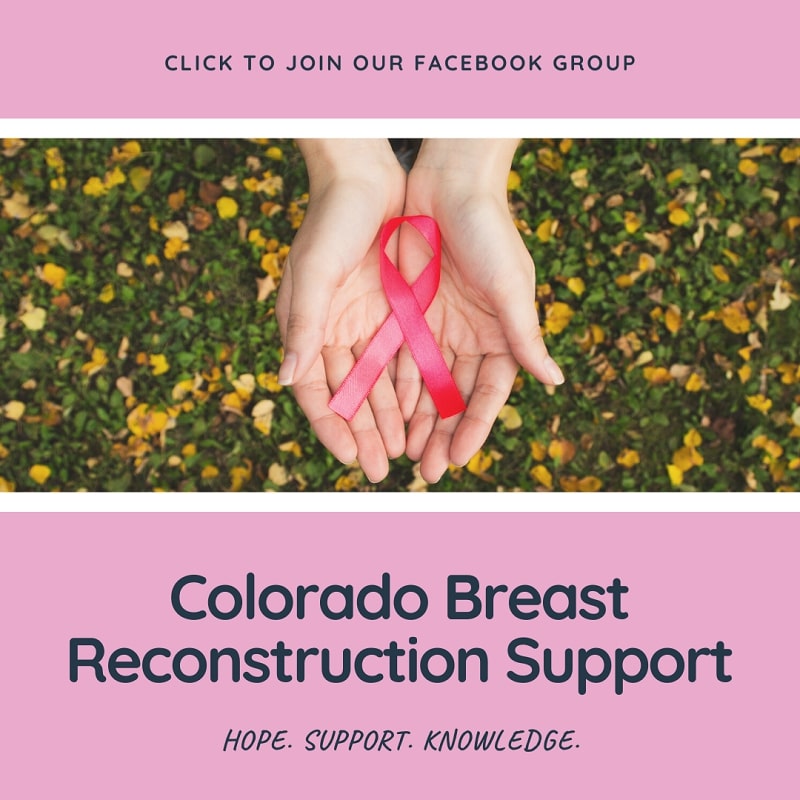Board-Certified Plastic Surgeons Serving Denver & Lone Tree, Colorado
At Park Meadows Cosmetic Surgery in Lone Tree, we understand that women considering breast cancer reconstruction in Colorado face deeply personal choices about what type of breast cancer reconstruction might be best for them. The Breast Center Park Meadows Cosmetic Surgery is designed to provide a caring environment for women considering breast reconstruction.
Our Denver area breast surgeons are experienced in the most advanced breast cancer reconstruction techniques. When performed by skilled and compassionate surgeons, breast reconstruction can dramatically improve self-esteem, confidence, and quality of life for breast cancer survivors in Colorado.
If you would like to learn more about your breast reconstruction options, please call us today at 303-706-1100. We proudly work with women from Denver, Lone Tree, and nearby areas of Colorado.

On this page, you will find information regarding:
- Breast Reconstruction after Cancer
- Who Is The Ideal Candidate For Breast Reconstruction?
- What Are The Stages of Breast Reconstruction?
- What Is Autologous Tissue Breast Reconstruction?
- How Does Breast Reconstruction with Implants Work?
- What Nipple Reconstruction Options Are Available?
- How Does Areola Pigmentation (Nipple Tattooing) Work?
- What Should I Expect at My Breast Reconstruction Consultation?
- Additional Resources
- Schedule Your Breast Reconstruction Consultation

Breast Reconstruction after Cancer
The diagnosis of cancer can be a frightening experience, but breast cancer is unique in the burden it places on women in our society. Breast cancer presents itself as a life-threatening challenge, but breast cancer survivors are often left feeling permanently altered or scarred by the surgeries that were employed in saving their lives. The perception of femininity is intimately tied to the female form and figure and it is common for breast cancer survivors to struggle at times with what they perceive as a loss of femininity, sensuality, and sexuality if they are left with scars upon their breasts or a mastectomy defect.
In the interest of establishing a comprehensive center for breast surgery, we have founded The Breast Center Park Meadows Cosmetic Surgery. It is our desire to offer women of the Rocky Mountain region the latest techniques in aesthetic and reconstructive breast surgery. Our partnerships with local hospitals, oncologic surgeons, medical and radiation oncologists all serve to ensconce the comprehensive care we believe our patients deserve.
Our mission at The Breast Center Park Meadows Cosmetic Surgery is to:
- Provide hope in a caring environment through education and compassionate care.
- Maintain the lofty aesthetic goals for breast reconstruction that we believe survivors deserve.
- Bring state-of-the-art surgical techniques for breast reconstruction to the women of Colorado and the region, such as "perforator-based microsurgical" techniques like DIEP Flaps for breast reconstruction.
- To seek proven strategies for breast reconstruction and to improve upon them, advancing our specialty and improving care to women of the Rocky Mountain region.
Who Is The Ideal Candidate For Breast Reconstruction?
The desire for breast reconstruction after cancer surgery is very personal and varies greatly among women. The only reason a patient should undergo the extra surgery to reconstruct her breast is for herself—and not to please anyone else—like a spouse or significant other. Surgeries carry risks, but these risks are almost always outweighed by the benefits of the end result.
The best candidates for breast reconstruction are:
- Patients without other major medical illnesses who can safely go through the surgical processes required to reconstruct the breast.
- Patients who can cope well emotionally with their diagnosis and treatment and can understand the risks of surgery. Setbacks can occasionally occur, so patients need to have the emotional ability and support structure to help cope with setbacks.
- Patients who have realistic expectations on the final results of breast reconstruction.
- Patients who have a positive outlook and who will partner with her surgical team to get the best result that can be achieved, but understand that every patient is different and every patient’s results are different.
- Every breast reconstruction is unique just as every patient is unique. There are many techniques that can be used to reconstruct a breast depending on the patient’s physical characteristics and desires.
"All I can say is this team of people at PMCS are a Godsend...I truly believe they are every bit as invested in my recovery process as much as I am. They are one big happy family and I believe those attributes were a big part of my highly successful recovery and reconstruction process."
How you can Prepare for Breast Reconstruction
Preparing for breast reconstruction can seem like a daunting task. Our team strives to make it as simple and unintimidating as possible. That is why we schedule pre-operative visits.
During your appointment with us, we will go over the steps needed to get ready for your procedure and provide written guidelines. These guidelines may include:
- Getting lab testing or a medical evaluation
- Taking certain medications or adjusting your current ones
- Avoiding anti-inflammatory drugs and herbal supplements
- When to fill your prescriptions
- What to bring with you on the day of surgery
- What to eat or drink prior to your scheduled surgery time
Make sure to arrange for a responsible adult to take you home and stay with you for 24 hours. You will not be able to drive after surgery, and you may need help to complete aftercare tasks.

What Are The Stages of Breast Reconstruction?
Patients should know that almost all techniques are "staged." That means there are at least 2 and often 3 steps to a complete breast reconstruction that includes the breast, the nipples, and the areola.
Stage One is usually the biggest operation and is frequently performed the same day as a mastectomy, also termed Immediate breast reconstruction. The patient usually spends 1 night in the hospital if tissue expanders or implants are used. If a patient chooses to use her own tissue (DIEP Flap) from her abdomen, then the patient usually stays 1 to 2 days in the hospital. For Delayed Breast Reconstruction, a Stage One Implant-Based Reconstruction is usually an outpatient procedure, while a DIEP Flap Reconstruction requires a 1 to 2 day hospital stay.
Stage Two is almost always a much quicker operation than Stage One and has a much shorter recovery time. These are typically outpatient surgeries after which the patient can go home. Many of them may conveniently be performed at our own Park Meadows Outpatient Surgery Center. Stage Two is usually a shaping procedure and includes time on the contralateral, or the non-cancerous breast, to help match the shape and contour of the reconstructed breast. Sometimes, nipple reconstruction can be performed during Stage Two as well.
Stage Three, if needed, is usually reserved for any final shaping, revision of donor sites, and nipple and areolar reconstructions.
Aftercare and Recovery for Breast Reconstruction Surgery
Breast reconstruction is a major surgery that needs post-operative care and downtime. Of course, the specifics of your recovery will depend on the type of procedure you undergo.
Autologous breast reconstruction, for example, requires you to wear an abdominal binder. Meanwhile, implant reconstruction and tissue expander placement do not. We provide detailed post-operative and home care instructions and are available to answer your questions.
In general, you can expect to take time off work and limit your physical activity. It will be roughly six to eight weeks before your body is ready for heavy exercise and strenuous work. Be patient with yourself during this process, and remember that it will pay off.

How Painful Is Breast Reconstruction Surgery?
It is normal to experience some short-term pain after any surgical procedure. However, our surgeons and nurses work hard to make sure that you are as comfortable as possible.
Broadly speaking, you can expect swelling in the reconstructed breast. You may also experience temporary numbness or tightness. Pain medication can be taken as needed and in moderation. Remember that you will feel better and stronger with every day that passes.
Scarring after Breast Reconstruction Surgery
Breast reconstruction surgery does leave scars. However, they are often located in areas that make them difficult to detect, such as around the areola and in the fold of skin under the breast.
DIEP flap breast reconstruction creates an additional scar on the lower abdomen. It will likely be below your bikini line, meaning that it can be covered with clothing and swimsuits.
With time and good post-operative care, your scars should look lighter. However, they will not fade completely. Many women find that scars are a necessary and worthwhile tradeoff.
Are There Follow-up Appointments After Breast Reconstruction?
Follow-up appointments are an important part of your breast reconstruction journey. Your first visit will take place one week after your surgery. Your surgeon will then see you at appropriate intervals to check your progress. We are here to support your success and wellbeing.
If you have any questions or experience any issues such as excessive swelling, do not wait until your follow-up appointment to get help. Contact your surgeon immediately.
"Dr. Chris Williams and his staff have treated me professionally, respectfully, as well as with care, empathy and exceptional experience during my breast cancer journey. Thank you Dr. Chris, nurse Sue, Danielle, Maria, Ashley, Amy and one and all!"
What Is Autologous Tissue Breast Reconstruction?

Autologous tissue breast reconstruction uses your own muscle, fat, and skin to rebuild your breast. With autologous tissue reconstruction, we can re-form breasts that look and feel more natural, without the need for artificial implants.
Our surgeons are among only a handful of plastic surgeons in the United States who perform the most advanced breast cancer reconstruction techniques, including perforator based microsurgical techniques that can help speed recovery and limit weakness at the donor sites.
The DIEP Flap is one of the most current methods available to reconstruct a breast. Excess tissue is removed from the abdominal region and this removal creates a tummy tuck effect. This tissue is then relocated to the chest to create a new breast mound. Sometimes, the DIEP Flap is used when a patient elected to have implant-based breast reconstruction in the past. The implants, over time, may need to be removed for a variety of reasons, including just a personal decision by the patient. After these implants are removed, a DIEP Flap and subsequent breast shaping surgeries can be performed.
The DIEP Flap is the preferred method for Autologous Breast Reconstruction performed by the surgeons of The Breast Center Park Meadows Cosmetic Surgery. View images of this procedure in our Autologous Reconstruction Before & After Gallery.

How Does Breast Reconstruction with Implants Work?
There are two options available to patients who chose to undergo breast reconstruction with implants: direct-to-implant reconstruction and reconstruction using tissue expanders.
Both methods of reconstruction can begin on the day of your mastectomy, and reconstruction using expanders can also be delayed until a later date. Direct-to-implant reconstruction does not involve tissue expanders and the implant is placed at the same time as your mastectomy surgery. This single surgery approach is attractive to many women, but there are also valid reasons for choosing to have reconstruction using tissue expanders. The expander creates the necessary room for implants and can be a good choice for women who are still receiving cancer treatment.
Our board-certified surgeons will discuss your options for implant-based breast reconstruction during your consultation.
Before And After

What is Nipple Reconstruction?
Following a skin-sparing mastectomy and subsequent breast reconstruction procedures, one of the final steps in the breast reconstruction journey is the creation of a nipple, also known as nipple reconstruction. Our surgeons typically perform this after all of the final shaping of the breast is complete and it is typically performed under a local anesthetic.
How Does Areola Pigmentation (Nipple Tattooing) Work?
This final step of reconstruction is an easy procedure at our Park Meadows office that can be completed in under an hour. The procedure is virtually painless and restores the circular pigment around the reconstructed nipple. Some women elect to choose a darker or lighter color than their original nipple areola color, making the experience a truly customizable procedure. The pigment is permanently placed using "tattooing" techniques. As with any tattoo, the pigments will tend to fade with time and acquiring the precise shade may require more than one pigmentation (tattoo) procedure.
This final phase of reconstruction, usually referred to as "nipple tattooing", often serves to transform the reconstruction into a breast that is truly your breast. This enables many survivors to lay their cancer burden down and move forward in life with restored femininity.
Perhaps you have had your breast reconstruction elsewhere and are just looking to have tattooing completed; we can absolutely see you and determine a color that is appropriate for you.

What Should I Expect at My Breast Reconstruction Consultation?
Many insurance policies include breast reconstruction coverage. Before your consultation with us, our staff will gather your health insurance information and help you verify your coverage. We will verify whether your policy covers the cost of your breast reconstruction consultation. Once we verify this information, we will send you a link to our breast reconstruction video so you can view it prior to meeting with the plastic surgeon. This video includes information about breast reconstruction options available to you.
What to Consider Before Your Breast Reconstruction Consultation
Many insurance policies include breast reconstruction coverage. Before your consultation with us, our staff will gather your health insurance information and help you verify your coverage. We will verify whether your policy covers the cost of your breast reconstruction consultation. Once we verify this information, we will send you a link to our breast reconstruction video so you can view it prior to meeting with the plastic surgeon. This video includes information about breast reconstruction options available to you.
During Your Consultation
You will meet with one of our board-certified plastic surgeons for a consultation at our Lone Tree office. You can discuss your concerns, what you expect from breast reconstruction and what your options are, and ask us any questions you have. The consultation will include an exam by the surgeon so he can provide you with information and surgical options personalized to your body. You and the surgeon will also discuss the risks and benefits of breast reconstruction.
After meeting with the plastic surgeon, you will meet with our Patient Navigator to discuss the costs associated with the procedure, get answers to any further questions and to discuss next steps. She will help you with all aspects of coordinating your breast reconstruction procedure, including scheduling your appointments, getting pre-authorization from your insurance company and coordinating care between your plastic surgeon, your oncologist and other doctors who are caring for you.

Additional Resources
Oncoplastic Breast Surgery (Breast Conservation Techniques)
Schedule Your Breast Reconstruction Consultation
To learn more about breast reconstruction in Colorado, contact our board-certified surgeons at The Breast Center Park Meadows Cosmetic Surgery in Lone Tree serving Denver and all of Colorado. Schedule a confidential consultation online and take a tour of our state-of-the-art facility by filling out the consultation request form in our contact page here, or call 303-706-1100 with any questions about our breast reconstruction services.

